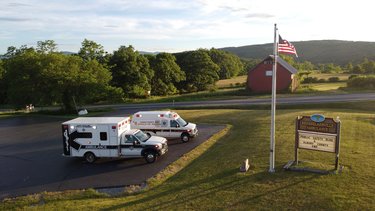‘That is fraud’: Berne signs ambulance contract despite lack of funds
BERNE — In a 3-to-1 vote on preceded by aggressive questioning by the dissenting board member, the four-person Berne Town Board authorized Supervisor Dennis Palow at its May 6 meeting to enter into a contract with Albany County for ambulance service that will cost the town $225,000 — money it does not appear to have in its $2.6 million budget.
That money will be due in January, after Palow leaves office and an all-new board takes over. The town has been showing signs of severe fiscal problems, having already overdrawn its payroll account several times in 2023 and letting utility bills go un- and underpaid for years.
New York State Town Law says that a town shall not enter into a contract it has not budgeted for unless funds are transferred to the appropriate account.
Councilwoman Melanie laCour, who cast the “nay” vote, had been appointed to the board in January by the governor after three board members quit last August partly out of concerns over how Palow was handling finances.
At the May meeting, laCour pressed Palow before the vote on his decision not to include even an estimated cost for ambulance service in his 2025 budget, which he had been able to create unilaterally due to the resignation of most of his fellow Republican board members.
“I just don’t think I can vote ‘yes’ for something that I’m not sure where we’re going to get the money to pay for it,” laCour said, emphasizing that her concerns had nothing to do with the actual ambulance program from the county sheriff’s office which the town has relied on for years.
LaCour had asked at last month’s meeting how the town would pay for the service when the expense was not included in the budget and all the revenue has been committed to other things.
She had agreed to receive an explanation outside of that meeting, but said this week that her questions hadn’t been answered.
“Last time, I was told it was sales tax, and then I was told it was not included in the budget because there was no signed contract, but it’s a yearly expense that we knew was going to happen,” laCour said.
Account clerk Andrea Borst all but acknowledged that the town is in a difficult spot — but tried to make it seem like it was an inevitability outside the town’s control, which is not true.
“The amount is going to have to be paid in [January] 2026, so during budgeting time, we have to then look at: How are we on sales tax, because that’s a majority of where our revenue is coming from,” Borst said.
Berne, like the other Hilltowns, relies primarily on sales tax, which is distributed by the county based on population (not sales by local businesses), and on property taxes to fund its budget.
Borst claimed falsely that, because Palow did not have a town board to vote on a budget that would pierce the 2-percent state-set tax cap, he could not raise taxes beyond that 2 percent and so could not include ambulance money in the budget and still be able to balance it.
However, as The Enterprise reported last year, Palow would have been able to raise the taxes however much he wanted — and, in fact, his first budget draft increased them by 19 percent before he removed the ambulance line — without a board vote, according to the state comptroller’s office.
Palow had even acknowledged this during a televised interview with Channel 10.
Because there was no board to vote on a tax-cap override, the state would have overseen the use of that excess money, the exact nature of which was unclear because the law that allows for this had not anticipated Berne’s situation, having been designed for clerical or technical errors in tax collection.
Borst also claimed that the expense was not included because the cost for ambulance service could not reasonably be estimated.
“It is hard to put a dollar figure in the budget when there hasn’t been a contract for two years,” Borst said.
Berne has paid for ambulance service every year, even when there has been no contract.
Borst explained in the same meeting that the town recently paid its roughly $175,000 bill for service in 2024 — which was a $66,000 deduction from what the town actually would have owed, courtesy of the county sheriff’s office.
Paying that bill used up virtually all of the unassigned fund balance that the town had left, which, besides sales and property taxes, is the only substantial pool of revenue it could draw from.
Borst said the town had around $207,000 at the end of the year. Taking $175,000 away leaves just $32,000.
The Republican town board had in recent years drawn down a substantial fund balance accumulated over decades by prior Democratic boards in order to reduce Berne property taxes.
The town did recently receive $150,000 from the sale of Switzkill Farm to Albany County, bringing the presumed amount of extra cash to $182,000 — still $25,000 short of what it will owe for service this year.
Borst said that the board will have to “make a decision” when it’s time to budget for 2026, even suggesting that the board begin reflecting the value that will be due in January for the previous year rather than the cost of that year’s service.
“If we sign the agreement,” Borst asked, “will we appropriate it? Move money forward? Do we put that dollar amount into the budget for 2026, because it’s always due the following year?”
She also said that she won’t know the “dollar amount” until the board signs the contract, despite the $225,000 being verbally agreed upon. Costs in budgets are rarely known exactly, and properly estimating them is part of the job of the town supervisor and any personnel he relies on while crafting the budget.
A guide document published by the state comptroller’s office states, “A good annual budget begins with sound estimates and well-supported budgetary assumptions. Spending levels and financial resources must be accurately gauged at budget preparation time to ensure that planned services are properly funded. To develop sound estimates, budget officers should avail themselves of as much pertinent data as possible. While valuable information is available from a number of sources, the budget officer should also work closely with department heads to develop a realistic annual budget.”
Borst, as it happens, is the highest paid town employee across the Hilltowns, earning $76,610 annually, according to fiscal data from The Empire Center, a nonpartisan not-for-profit. Palow is the highest paid Hilltown supervisor, earning $23,000.
“This is a yearly expense,” said laCour at the May meeting of ambulance service, “and you just completely left it out of the budget. All the money in the budget is accounted for. And now you’re saying we’re going to add this on top of it, and you’re not telling me where that money is coming from … I am not going to enter into a contract I know we can’t pay for. That is fraud.”


